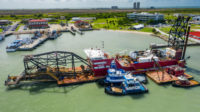Saying that it recognized revenue from change orders on demolition work too soon, Great Lakes Dredge & Dock Corp. is restating its financial results for 2012, negotiating with lenders after breaching its credit agreements and parting ways with Bruce Biemeck, its president and chief operating officer, the company said.
Biemeck’s departure “was not for cause,” said Jonathan Berger, the company’s chief executive, during a teleconference March 15 with stock analysts who follow the company.
William Steckel, who replaced Bruce Biemeck as chief financial officer in August 2012, remains with the company.
Great Lakes (GLDD-NASDAQ) says it is the biggest dredging contractor in the U.S. and owns a major equipment fleet.
The restatement and poor 2012 financial results arose mostly from Great Lakes' demolition segment, where $8.2 million in revenue in the second and third quarters was recognized prematurely and another $5.6 million expected in the fourth quarter is delayed, the company said. Great Lakes’ principal demolition subsidiary is North American Site Developers Inc., a Boston-based unit whose 2012 projects include work in New England, North Carolina and New York State.
Great Lakes officials would say only that most of the delayed payments involved change orders on work on two projects in the New York area. Great Lakes served as a prime contractor on one and as a subcontractor on the other.
“We did the work and we did it well,” Berger told the analysts. But approval of payments by the client was a long, complicated process, he said.
The trouble will delay Great Lakes’ filing of its federal annual report, but the company disclosed 2012 financial results that were below its earnings guidance for the year. The company says it lost $2.7 million in 2012, compared to net income of $16.5 million in 2011, on revenue of $687.6 million, up from $627.3 million in 2011. The company’s shares fell as low as $6.14 after the initial March 15 announcement, down from a 52-week high of $10.07, but closed March 18 at $6.89.
“While the information is disappointing,” says Berger, Great Lakes has a backlog over $400 million "and we see strong earnings in the future.”
Some of the revenue growth, company officials say, will come from harbor deepening and maintenance work in New York, New Jersey, Maryland and Louisiana. Although the Army Corps of Engineers’ budget will likely shrink, it will still be substantial, and work needed after Superstorm Sandy will help.
Big Projects in Australia and Bahrain
Outside the U.S., Great Lakes has significant projects in Australia and Bahrain. Preparations for a big Australia project consumed significant cash during the year, as did maintence work on some equipment, contributing to the weak financial showing.
While the domestic dredging bid market for 2012 fell to $939 million, compared to $1.04 billion in 2011, Great Lakes says it won over a third of that work and has done so consistently during the last three years.
Based in Oak Brook, Ill., the company says its strategy includes growth through its demolition and environmental units. On Dec. 31, Great Lakes paid $26 million for Terra Contracting, which provides environmental, maintenance and infrastructure-related services.
One analyst noted that Great Lakes had had problems with profitability on demolition work before. "Here we are back at demolition issues," the analyst suggested. "Demolition by its nature is a lot more competitive and the projects complicated."
Great Lakes' Berger says the company tries to improve margins in all market segments by taking advantage of its equipment fleet, moving away from the commodity side of the business.
Another way to improve margins is to become a direct contractor rather than a sub, he said. "But for that we need a different set of project managers and accounting managers and have to have better systems."



Post a comment to this article
Report Abusive Comment